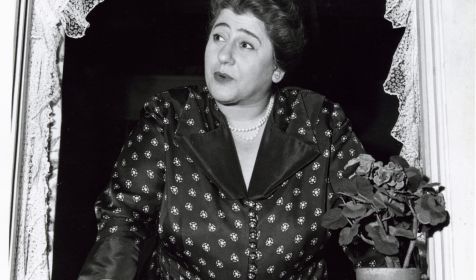 GERTRUDE BERG AS MOLLY GOLDBERG YOO-HOOS OUT HER TV SHOW WINDOWA somewhat soft portrait of a somewhat forgotten ladyYoo Hoo, Mrs. Goldberg
GERTRUDE BERG AS MOLLY GOLDBERG YOO-HOOS OUT HER TV SHOW WINDOWA somewhat soft portrait of a somewhat forgotten ladyYoo Hoo, Mrs. Goldberg is American pop history with a twist. Gertrude Berg was a radio and television pioneer who created a persona, the sort of immigrant Mamma a Greek woman could connect with, though the family of her "Molly Goldberg" character (she wrote and acted the part) was Jewish and came from Eastern Europe. In the bland Fifites "Leave It to Beaver" era, Berg created a counter-image that was urban and ethnic. Documentary filmmaker Kempner made a 1988 film about Hank Greenberg. As she tells it, Gertrude Berg created the sit-com, a field ultimately dominated by Lucille Ball, but only when "Yoo Hoo, Mrs. Goldberg" faded due to political pressures. So Jewish ethnicity paved the way for WASP conventionality.
But Gertrude Berg's creation was a pop, bland (and middle-class) creation too, though this generally upbeat documentary doesn't analyze it much, except to point out that the TV show's final version, when the Goldbergs make it financially and move to the suburbs, lost the show's original spark. We don't get a very clear idea of what episodes of "Yoo Hoo, Mrs. Goldberg" were like from the film, except to experience Berg's personal warmth, sweet smile, melodious voice, and ample bosom. The emphasis is on gestures and brief interactions rather than plot-lines.
Because it relies on the visuals from old TV shows rather than (perhaps rare?) radio recordings (which may not even exist), it's not much emphasized that Molly Goldberg on radio actually went all the way back to 1929 (Gertrude Berg was born in 1898 and died in 1966). It's claimed that she did the first effective radio advertising, writing her own ads, notably for Sanka coffee. She also sold War Bonds. Her creation throughout its long run boldly provided, in an age of anti-Semitism, a relatively realistic and respectful, if gently comic, version of Jewish New York immigrant life shipped out to be consumed in the American heartland. What effect this had on Middle American thinking is not chronicled, though Ms. Berg's biographer, interestingly, is a young southern WASP type, Glenn D. Smith, who provides much detail of the life. His book is called
"Something on My Own": Gertrude Berg and American Broadcasting, 1929-1956. The radio show, also interestingly, was originally called "The Rise of the Goldbergs."
What is clear is that out-the-window air-shaft shouted "Yoo hoos" (the way of calling out to people, now old-fashioned) represent the interconnectedness of Brooklyn apartment dwellers in those days who hung out their windows and visited with one another on a day-to-day basis. Molly is always in an apron and always cooking. Yet women in the film remember her as a "feminist" figure because she was strong.
The idyllic state of a Jewish family included in pop mainstream American Fifties (and earlier) culture was to hit a terrible snag when McCarthy and the Red Baiting era came along. Philip Loeb, who played Mr. Goldberg, was a media union activist involved in multiple liberal causes. He was blacklisted and CBS shut down the show when Gertrude Berg refused to replace him. (She later relented and the series got two other Mr. Goldbergs.) The show had a more than year-long hiatus. Loeb committed suicide, and Zero Mostel (himself a blacklisted artist) played a version of the destroyed Loeb in Martin Ritt's 1976 movie,
The Front. Neither Gertrude Berg nor Molly Goldberg was ever quite the same after this. And as a famous Edward R. Murrow "Person to Person" TV interview stresses, the difference between Molly and Gertrude was hard to draw since the writer/actress spent more hours of the day being Molly than being Gertrude Berg. And her real name was Tillie Edelstein and her family and close friends always called her Tillie. The lovable Jewish earth mother's own mother, depressed from the death of a younger son, was cold and withdrawn: "Molly" was a hopeful fantasy (though late-Fifties TV was rich in some high culture and realism such as Playhouse 90, which gave live presentations of versions of Hemingway and Faulkner, William Saroyan and Clifford Odets).
During the Mrs. Goldberg hiatus time Lucille Ball began "I Love Lucy" and Ball took over the reigning iconic-TV-woman role. When "Mrs. Goldberg" folded Berg triumphed on Broadway in
A Majority of One (1959), a comedy about a Jewish widow involved in a romance with a Japanese millionaire. She, director Dore Schary, and co-star Sir Cedric Hardwicke swept the Tony Awards. Berg was devastated when Rosalind Russell was chosen over her for the movie version, and she was reduced to touring plays and summer stock thereafter and ultimately died, the narrator says, of overwork.
This affectionate and nostalgic documentary is full of information but could use more analysis. Some of its talking heads, which include Supreme Court Jutice Ruth Bader Ginzberg, indulge in numbingly vague and euphoric recall. Somehow both the magic and the shortcomings of "Molly Goldberg" and Gertrude Berg don't emerge as clearly as they might.
(
Showing in Landmark and some other theaters across the US starting July 10, 2009, and in Jewish film festivals.)





